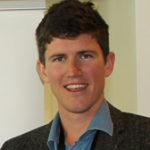

2012 Young Scholars: Ben McGowan

University of Melbourne
I was particularly interested to hear Prof Jonathan Foley talk. I’d followed his research quite closely as I was coming from the same angle: an environmental scientist’s interest in natural resource management in agriculture.
I’ve been working out on Vic Super’s Future Farming Landscapes project around Lake Boga, Western Victoria, so an excuse to leave the farm and head to the Bush Capital was gratefully accepted. I took a few days off and enjoyed an explore of Canberra before the conference began, building up to the conference with a weekend of sightseeing. I’d been looking forward to catching up with the other young scholars and the opening evening gave us the chance to meet up and compare notes. The diversity of young scholars was heartening and this valuing of diverse modes of thought and research was echoed throughout the conference.
I had been thinking about the possibility of taking up a PhD project and was hoping to use some of the discussion at the conference to guide my thinking. I was particularly interested to hear Prof Jonathan Foley talk. I’d followed his research quite closely as I was coming from the same angle: an environmental scientist’s interest in natural resource management in agriculture.
The speakers were of the highest quality, and again, took varied approaches in addressing the problem of food security. Research into food security was presented on a number of levels. There was a broad analysis of global trends by the likes of Prof Jonathan Foley and Dr Andrew Noble; this was unwrapped by presenters like Dr Shenggen Fan, Prof Xuemei Bai, Dr Derek Byerlee and Dr Nteranya Sanginga who considered global trends but also started to address regional and country specific problems; and finally, Dr Frank Rijsberman and Dr Trevor Nicholls presented an analysis of the scientific and extension innovations occurring at the ground level.
The question and answer section provided a forum for conversation around some of the new and innovative ideas occurring in natural resource management and agriculture. Ideas like payment for ecosystem services and market-based instruments for preventing environmental damage were discussed in some detail. There was also a discussion about what I term ‘strategy’: are we going to trust neoclassical economics and market signals to resolve the problems of food security, or should governments assume responsibility?
The conference was a validation of all types of research, and we heard from anthropologists through to plant physiologists. It was also a great forum for sharing research ideas, and promoting and discussing interdisciplinary research models. I took a few major thoughts away from the conference, which I’ve used to formulate a research question for next year. I remain interested in environmental issues in agriculture and found the ideas of payments for ecosystem services and market based instruments for environmental protection quite interesting. The use of environmental markets is becoming ubiquitous in Australia as markets for water, carbon, and biodiversity credits are rolled out. I’d like to undertake some research that analyses how these markets affect the management of natural resources in an agricultural setting. The new friends I’ve made at the conference will be a great source of companionship and inspiration as I begin a career in research.